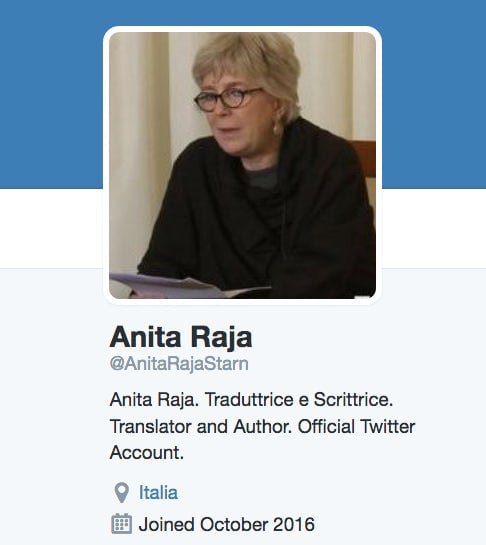(Updated: Fake, says publisher) “Anita Raja” says she is Elena Ferrante and asks to be left alone.
Update: The Twitter account was suspended after Ferrante’s publisher said it was a fake.


Update: The Twitter account was suspended after Ferrante’s publisher said it was a fake.
After days of speculation following an article simultaneously published in the New York Review of Books, the Italian newspaper Il Sole 24 Ore, the French news website Mediapart, and the German Frankfurt Allgemeine Zeitung over the real identity of Italian bestselling author Elena Ferrante, a pseudonym, a new Twitter account attempted to put an end to the literary storm—but only created more confusion.
Someone claiming to be Anita Raja, the Italian translator from Germany that reporter Claudio Gatti pointed to as the woman behind the hugely successful novels set in Naples signed Ferrante, made a brief apparition on Twitter as @AnitaRajaStarn Wednesday (Oct. 5):

The photo appears to be of Raja from a 2015 literary conference. In six terse tweets, “Raja” writes (in Italian, our translation):
First tweet: “I open this Twitter profile and I will soon close it. I will only be here for the time necessary to explain.”
Second tweet: “I confirm. I am Elena Ferrante. But this, I believe, does not change anything in the relationship readers have with books by Ferrante.”
Third tweet: “Those books are and will remain Elena’s, not mine. I do not intend to talk in any way using the first person, nor will I give interviews or issue statements.”
Fourth tweet: “I find vulgar and dangerous the way in which it was chosen to pretend to unveil an identity violating privacy and rules. But let’s be patient.”
Fifth tweet: “I would only like to ask, now that the curiosity that has been lasted for years has been fulfilled, to let me live (and write) in peace”
Sixth and final tweet: “I repeat: I will never talk about Elena Ferrante, nor will I answer in her name, nor will I say anything about her books. Thank you. Anita Raja.”
There is no way to immediately confirm that the account does, in fact, belong to Raja. And as soon as it appeared, and the tweets were widely shared, some speculated that the account might be yet another impersonation of the real Elena Ferrante. Italian newspapers reported the account was a fake, and her publisher’s spokesman called it “a fake” on Twitter. Her publisher also said, though, (link in Italian) that the author was traveling, and that they had not been in contact.
The “outing” by Gatti, which was done against the wishes of the anonymous author after she stated in numerous interviews that she wanted her books to speak for themselves, caused a huge uproar in new and traditional media in Europe and the US, with the great majority of commentators and readers expressing outrage over Gatti’s intrusion in the writer’s privacy.
Gatti had decided to “follow the money”, by looking into the finances of the Italian publisher of Ferrante, e/o edizioni, in order to discover who Ferrante is, and claimed that such an investigation was in the public interest, since the writer had “lied” to her readers by hiding her identity.